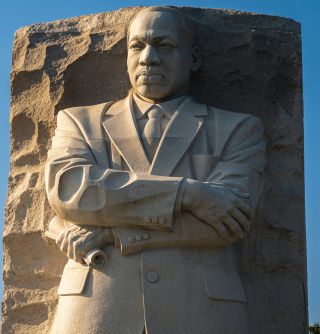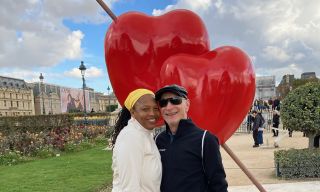MLK’s messages of love, purpose, and empathy support the pillars of resilience.
The power of love and the goal of peace
What’s most missing in people’s lives is a feeling of peace. You’re on a treadmill, rushing from one stress and worry to another. Whenever I looked at Dr. King, despite being at the center of the fight for civil rights, his face always looked peaceful. There was a calmness to him and his voice that reflected a heart full of love. Above everything else, he believed in the power of love. Perhaps his greatest message was the primacy of love and empathy.
One of the hallmarks of resilience is the ability to self-regulate physiologically, emotionally, and mentally. In my use of biofeedback to facilitate this process, I’ve learned that focusing on the heart and coming from a place of gratitude and love produces a heart rate variability pattern referred to as coherence. This occurs when there is a balance between the two branches of the nervous system: sympathetic activation and parasympathetic recovery. The more I or my clients focus on the heart and feelings of love and gratitude, the more coherent the heart rate pattern becomes. There is a shift of the mind, body, and heart into positive states.
Dr. King knew then what we are now learning in science: that coming from the heart has positive physical, emotional, and mental benefits. This is the first and biggest lesson we can model: Love and gratitude are shortcuts to experiencing a state of balance. I encourage all of you to take this lesson from the master. Try meditating on love and your heart. Breathe in and imagine filling your heart, expanding your heart, with love. Do this for just five minutes, at six breaths per minute, and then notice how this makes you feel.
Empathy and forgiveness
There is much negativity in the world. Personal attacks, anger, and resentments fill the Internet and the airwaves. While we may try to ignore this toxic brew, these repeated messages unconsciously get absorbed. They lower your threshold for becoming activated, upset, and angry. It’s then easy to find yourself feeling and expressing anger. Just as love produces optimal coherence of the heart, negative emotions have the opposite effect, producing chaotic heart rate patterns that impair health and our emotions. If you want to find peace, you must first find ways to let go of any negative feelings, such as anger and frustration.
MLK said, “Darkness cannot drive out darkness; only light can do that. Hate cannot drive out hate: only love can do that.” The lesson here is to be constantly vigilant of the messages you are hearing or seeing, say “no” to them, and counter them with how you want to be in the world.
At the same time, be vigilant of what lurks inside you—your anger, resentment, and vindictiveness. Dr. King said, “Be quick to forgive. Preventing hatred starts by learning to forgive quickly.” And I would suggest that forgiveness begins by focusing on yourself. What negative thoughts or judgments do you carry toward yourself? What have you been struggling to let go of?
Honor this special day of remembering Martin Luther King and use him as a model. What would he say to you about any negativity you are harboring toward yourself? Can you imagine the words he would speak to you and take them to heart?
The importance of empathy
How does change come about? I would suggest that if you try putting yourself in someone else’s shoes, you will feel much differently about that person. If you truly give yourself an opportunity to see out of their eyes, to experience what they are going through, it will be easier to let go of anger, and it will also create a bridge between the two of you. King believed that empathy was a key element in the struggle for civil rights.
Try learning the lessons from Dr. King and practice empathy in your closest relationships. My sixth pillar of resilience is emotional balance and mastery. Here is an opportunity to develop along this dimension of resilience.
Seek purpose and dare to dream
Martin Luther King was propelled by his dream. The dream of a just society. What’s your dream? What gets you up in the morning? The more you want to jump out of bed because you have a purpose, the more resilient and successful you will be. In a previous Psychology Today article, I proposed that purpose was the ultimate “use it or lose it” and that it can increase your longevity.
Find something to live for. It doesn’t have to be big, just big enough to propel you forward. MLK said, “I submit to you that if a man hasn’t discovered something that he will die for, he isn’t fit to live.” Those are strong words and reflect how committed to his own purpose he was. Risking and losing his own life for it.
You can take this lesson at your own speed but dare to dream. Ask yourself, “Why am I here?” If you don’t have an answer, a valuable use of your time would be searching for the answer. Dare to dream is my powerful challenge to you. It resonates with the notion of a growth mindset. Part of his lesson was that a dream opens the door to possibilities and shifts the focus away from the obstacles.
Personal power
My ninth pillar of resilience is power, which I define as the ability to get things done. For many of you, fears and judgments get in the way of taking actions that can produce results. Frequently, you allow yourself to focus on the obstacle, the difficulties, or the fears that stop you in your tracks. What moves you forward is raising your courage just enough to overcome your fears. Pair your dream with finding the courage to take action.
Martin Luther King faced serious danger every time he stepped onto the street or onto the stage to take a stand. His life was constantly in danger. It wasn’t only his courage that propelled him; it was also his faith and trust in his faith. He said, “Faith is taking the first step even when you don’t see the whole staircase.” Rarely when we set out to achieve a goal do we see or know all the steps. Faith is what made the difference for him. In addition to faith, can you find a way to trust yourself?
MLK said, “If you can’t fly then run, if you can’t run then walk, if you can’t walk then crawl but whatever you do you have to keep moving forward.” If you can’t walk, then crawl! Frequently, we get stopped in our tracks because we are fearful of the next step we will see. But we can also get stuck believing we need to take a step that’s too big for us.
Always look for a step that is within reach of your outstretched arm. In your life, take whatever baby step you are able to take. But, as he said, keep moving forward.
Resilient communities and responsible leadership
The background “noise” of our environment and society right now is filled with crises and anger that are destructive. Do we have leaders who are taking their example from MLK? Do we have leadership that is pointing the way of love, connection, and compassion?
MLK said, “Apathy cannot be tolerated by an individual, a leader, or an organization. If you see something happening, don’t wait for the negative ramifications to occur. Respond to the issue and act. If nothing is said or done, then silence connotes complicity.”
Here is where you begin to make a difference in your community. It’s important to expect and demand leadership to take their example from MLK and refuse to promote hate. But find a way to take some action. Again, MLK, “The ultimate measure of a man is not where he stands in moments of comfort and convenience, but where he stands at times of challenge and controversy.”
Resilient communities are ones in which love, not hate, is highlighted. MLK said: Love always wins in the end. He also frequently stated that no one wins with hate, saying, “Let no man pull you so low as to hate him.”
On this day of remembering a prince of love and peace, find love and peace in your own heart. And then project it out into the world.


